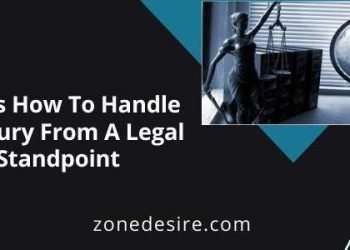Personal injury can tend to be a confusing area of the law
A personal injury is one that’s caused by the negligence of another person. Under the law, you have the right to recover compensation from a party at fault if you’re hurt in an accident that’s not your fault. You could be injured by a car accident, motorcycle, pedestrian, bike accident, boating accident, or dog bite, just to name a few scenarios covered by personal injury.
The term negligence is one that’s very important in personal injury law because it’s when someone doesn’t use reasonable care that would be needed to prevent harming others.
There’s always a chance that anyone could be involved in an accident that’s not their fault, so they need to have an idea of how personal injury law works. With that in mind, the following are six of the most common myths about personal injury.
1. Minor Injuries Mean You Don’t Need a Lawyer
One of the first myths that are pervasive is that if you have minor injuries, you don’t need a personal injury lawyer.
The reality is that you may be entitled to have at least your medical expenses covered if you’re hurt because of something that’s another person’s fault.
In situations where someone’s injuries are minor, it’s most common for an insurance company to try to offer the lowest possible amount. These amounts may not be enough to cover even your most basic medical care and expenses for your injuries. Working with an attorney can help you get a fair settlement.
2. The At-Fault Party Has to Pay Out-of-Pocket
There’s a myth that if you sue someone for the harm they caused you, you’re going to be financially ruining them. That emotional component makes people less likely to try to recover compensation.
In actuality, you aren’t going to be making the other person’s life miserable because, in the vast majority of cases, they aren’t paying a settlement out of pocket. Their insurance company pays for it.
3. The Insurance Company Won’t Go Beyond Its Initial Offer
An insurance adjuster is going to do everything they can to avoid paying someone who’s hurt in an accident, including telling them that their offer for a settlement is the best and highest they’re going to give.
Adjusters do an investigation, and they do their own research as a way of establishing the value of damages.
The first offer they give someone is usually a percentage of what the company thinks will end up being the final value of the case. The first offer someone gets from an adjuster is typically the lowest amount the adjuster thinks someone will accept.
They want you to accept it quickly, which is why they tell you it’s the best possible offer. The hope is to pay the least amount possible in the shortest window of time and close out the case before you have time to talk to a lawyer.
4. Claims Take a Long Time
If you get an immediate offer from an insurance company, it’s going to be low. It will take more time if you decide to work with a personal injury attorney, but it doesn’t necessarily have to take years.
If you get a quick payout, you’re not going to be fully compensated, including for the possible long-term effects of the injuries you suffered.
When you work with an attorney, they’re going to look at the full possible impact of your injuries, and they’re going to secure medical documentation to support your claim.
It does take some time to build a strong case, but the payoff can be significantly more compensation.
5. You’ll Have to Go To Court
Even when people are hurt and could have a legitimate personal injury claim, they may shy away from pursuing it because they’re afraid they’ll have to go to court.
The overwhelming majority of cases that are personal injury do not go to court. Most settle well before it goes to trial.
6. You Have Plenty of Time to File a Claim
Every state has a statute of limitations for these types of personal injury claims. This is a window of time within which you’re allowed to file a lawsuit following your accident. The goal of a statute of limitations laws is to help make sure evidence is still available and to ensure the litigation is being handled quickly after an event.
Most states have a statute of limitations of two years, but it can vary. Once the time passes, your claim will be dismissed.















